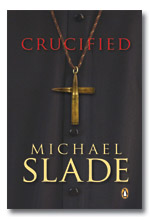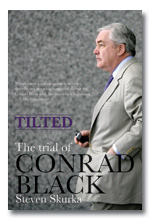 Crucified
Crucified
By Michael Slade
Penguin Canada, 2008
333 pages, $24
Reviewed By Claire Hastings
When a page-one crucifixion sets the scene for assassination plots, atomic bombs, demonic possession, medieval torture and carnal lust, delicate readers may have second thoughts. The latest thriller by Michael Slade (nom de plume of father/daughter collaborators Jay and Rebecca Clark) delivers a reliable trio of mystery, sex, and gore. Fittingly, Jay Clark is a lawyer and historian specializing in the law of criminal insanity.
Wyatt Rook, writer, investigator, and a non-practising lawyer, heads to London on a book tour. The discovery of a British World War Two bomber in Germany reveals a plot to assassinate Hitler and offers clues to the location of the Holy Grail. While you hoist your disbelief, Rook pursues the Grail and trades knowledge — in both the biblical and factual sense — with Liz Hannah, a “knockout in her mid-20s” whose grandfather disappeared with the bomber. Rook is pursued by a Vatican emissary, Her Majesty’s constabulary, and presumably the taste police for sentences like: “Gagged with a ball…She could speak only through her eyes.”
The plot moves at breakneck speed, often hitting multiple locations and eras in one chapter. The wealth of information offers both smug satisfaction (I already knew hard candy was made by the melting and cooling of sugar cane), and unease (Is there a quiz at the end?). It’s hard enough to keep track of which Inquisition-esque technique killed which minor character, so until salvation comes in the form of a Sunday roast, you’d best relax and enjoy the ride.
 Tilted: The Trial of Conrad Black
Tilted: The Trial of Conrad Black
By Steven Skurka
Dundurn Press, 2008
277 pages, $24.99
Reviewed By Jordan Timm
Toronto criminal defence lawyer Steven Skurka spent several months in Chicago last year as a legal analyst for CTV, attending the trial of Conrad Black. Skurka remained optimistic about Black’s fate, highlighting the differences between Canadian and American justice, and questioning the fairness and function of the U.S. legal system. Tilted is his attempt to make sense of the court’s conviction — an outcome which he believes was a miscarriage of justice.
In addition to his television gig, Skurka maintained a prodigious Black-inspired output on his blog, thecrimesheet.com. There he offered daily analysis of the proceedings, with frequent digressions into personal anecdotes, and a side of terrible puns. Tilted draws heavily from these blog posts.
Black’s guilty verdict is well known, so Skurka’s chortling over prosecutorial missteps and present-tense anticipation of a not-guilty verdict make for an odd read, and lead the reader to either mistrust the narrator’s judgment, or mistrust the system that rendered the verdict.
Skurka is most effective where he argues directly for the latter conclusion, in the book’s first 40 pages. He raises interesting questions about the vagaries of the U.S. system and its skew to the prosecution.
Tilted doesn’t delve too deeply into these ideas, opting instead for the diary-style courtroom chronicle (one that lacks any substantial behind-the-scenes access). Readers hoping for a definitive account, or for a substantial study of the differences between two legal systems, may find that Tilted fails to satisfy.

